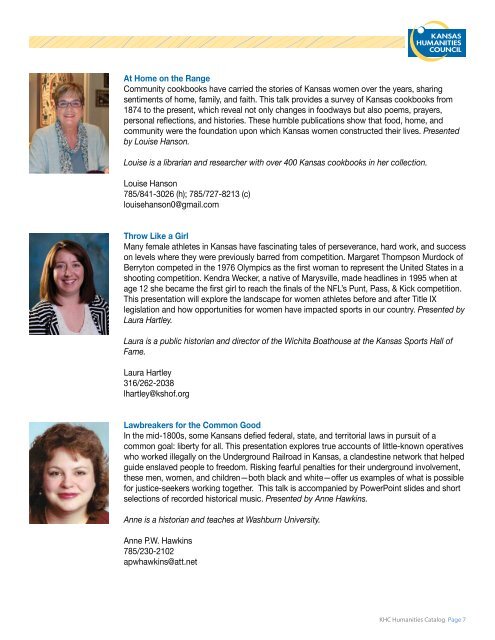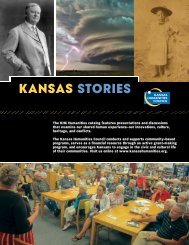KANSAS STORIES
1SvGw1V
1SvGw1V
Create successful ePaper yourself
Turn your PDF publications into a flip-book with our unique Google optimized e-Paper software.
At Home on the Range<br />
Community cookbooks have carried the stories of Kansas women over the years, sharing<br />
sentiments of home, family, and faith. This talk provides a survey of Kansas cookbooks from<br />
1874 to the present, which reveal not only changes in foodways but also poems, prayers,<br />
personal reflections, and histories. These humble publications show that food, home, and<br />
community were the foundation upon which Kansas women constructed their lives. Presented<br />
by Louise Hanson.<br />
Louise is a librarian and researcher with over 400 Kansas cookbooks in her collection.<br />
Louise Hanson<br />
785/841-3026 (h); 785/727-8213 (c)<br />
louisehanson0@gmail.com<br />
Throw Like a Girl<br />
Many female athletes in Kansas have fascinating tales of perseverance, hard work, and success<br />
on levels where they were previously barred from competition. Margaret Thompson Murdock of<br />
Berryton competed in the 1976 Olympics as the first woman to represent the United States in a<br />
shooting competition. Kendra Wecker, a native of Marysville, made headlines in 1995 when at<br />
age 12 she became the first girl to reach the finals of the NFL’s Punt, Pass, & Kick competition.<br />
This presentation will explore the landscape for women athletes before and after Title IX<br />
legislation and how opportunities for women have impacted sports in our country. Presented by<br />
Laura Hartley.<br />
Laura is a public historian and director of the Wichita Boathouse at the Kansas Sports Hall of<br />
Fame.<br />
Laura Hartley<br />
316/262-2038<br />
lhartley@kshof.org<br />
Lawbreakers for the Common Good<br />
In the mid-1800s, some Kansans defied federal, state, and territorial laws in pursuit of a<br />
common goal: liberty for all. This presentation explores true accounts of little-known operatives<br />
who worked illegally on the Underground Railroad in Kansas, a clandestine network that helped<br />
guide enslaved people to freedom. Risking fearful penalties for their underground involvement,<br />
these men, women, and children—both black and white—offer us examples of what is possible<br />
for justice-seekers working together. This talk is accompanied by PowerPoint slides and short<br />
selections of recorded historical music. Presented by Anne Hawkins.<br />
Anne is a historian and teaches at Washburn University.<br />
Anne P.W. Hawkins<br />
785/230-2102<br />
apwhawkins@att.net<br />
KHC Humanities Catalog Page 7



